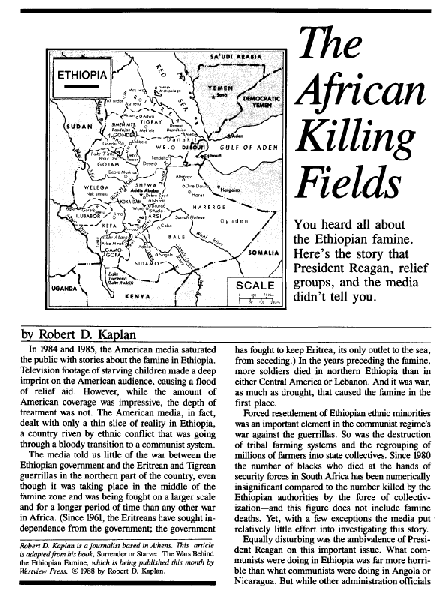 When Robert Kaplan referred to Ethiopia as the “African killing field” and argued that the manner with which Ethiopians were killed by Menghistu Hailemariam’s military junta, evoked the well-known slaughter of millions of Cambodians by the Khmer Rouge, there were critics who said it was not the same thing. They argued that Menghistu’s “Derg” regime was motivated by a desire to stay in power, and not an ideology to change and purify the ethnic demography of Ethiopia by destroying particular ethnic groups. The minority regime ruling Ethiopia with an iron fist is said to be much worse than the Derg regime.
When Robert Kaplan referred to Ethiopia as the “African killing field” and argued that the manner with which Ethiopians were killed by Menghistu Hailemariam’s military junta, evoked the well-known slaughter of millions of Cambodians by the Khmer Rouge, there were critics who said it was not the same thing. They argued that Menghistu’s “Derg” regime was motivated by a desire to stay in power, and not an ideology to change and purify the ethnic demography of Ethiopia by destroying particular ethnic groups. The minority regime ruling Ethiopia with an iron fist is said to be much worse than the Derg regime.
As the Ethiopian protests rage across the country, the regime in Ethiopia’s ethnic based policies, the genocides committed in the Gambela, Ogaden and Oromo people, its villagization and resettlement programs, as well as its expansionist policies, certainly qualify its rule, like that of Pol Pot’s, to be “an ideology to change and purify the ethnic demography of Ethiopia”.
Today, Hailemariam Desalegn and his cadres have referred to the peaceful protesters as anti-peace elements, terrorists etc. In February 2016, the BBC reported that Hailemariam Desalegn, Ethiopia’s Prime Minster had said that “destructive forces” in Oromia, backed by Eritrea (favored scapegoat), were “on a mission to subvert the system and change the government”. He said that his regime would take “decisive action”.
In a March 2016 Interview, Hailemariam Desalegn, speaking about the 6 month long protests and the violence that has claimed the lives of hundreds across Ethiopia, was singing a different tune. He said:
“…The root cause of protests in this country is not politics. It is having so many young people who are unemployed. We haven’t addressed the unemployment problem in Oromia and also in other parts of the country…There is lack of good governance, especially at the grassroots [in Oromia]. Farmers are evicted from their land without proper legal process. Those who want [to take] land in a corrupt way, working with some private sector people, are evicting farmers, and the farmers resent. Farmers are the social base for this party. So if farmers resent, then there will be unrest…”
But the two tongued Prime Minister was once again singing a new rehearsed tune when he addressed the Ethiopian Parliament in March 2016. He told parliamentarians that “anti-peace forces” were responsible for the violence.
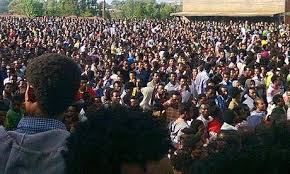 Getachew Reda, Ethiopia’s Information Affairs Minister in December of 2015, when the protests were limited to the Oromia region said that the regime would“exorcise” the “demons” out of the people of Oromia. When the protests expanded to the Amhara region, Reda at a Press Conference said that members of an “illegal committee” were responsible for “murder and kidnappings”. Fear mongering seems to be the regime’s modus operandi. Internet services in Ethiopia have been disrupted, but reminiscent of the Radio-Television Libre des Mille Collines (RTLMC) that preached ethnic hate, the minority regime’s supporters in the Diaspora have used social media to incite violence against the various ethnic groups in Ethiopia, especially the Oromo and the Amhara.
Getachew Reda, Ethiopia’s Information Affairs Minister in December of 2015, when the protests were limited to the Oromia region said that the regime would“exorcise” the “demons” out of the people of Oromia. When the protests expanded to the Amhara region, Reda at a Press Conference said that members of an “illegal committee” were responsible for “murder and kidnappings”. Fear mongering seems to be the regime’s modus operandi. Internet services in Ethiopia have been disrupted, but reminiscent of the Radio-Television Libre des Mille Collines (RTLMC) that preached ethnic hate, the minority regime’s supporters in the Diaspora have used social media to incite violence against the various ethnic groups in Ethiopia, especially the Oromo and the Amhara.
The efforts to undermine the Ethiopian peoples’ courageous protests continue.
On 27 August 2016, Hager Fikir, one of the Washington based radio programs, invited Ato Mulugeta, an official in charge of Diaspora Affairs at the Ethiopian Embassy in Washington to talk about the protests that have engulfed Ethiopia. Once again, the regime’s cadre blamed the protests on a “few people”, and claimed that 99% of the people did not support the protesters. The cadre’s contempt for the people of Ethiopia is evident. Dismissing their voice, he labeled the protesters as being a few “balegowoch” and “werebelawoch”. Cambodia’s Pol Pot used menacing labels such as enemies, traitors and ugly microbes to incite the killings of his own people. Just like in Pol Pot’s Cambodia, these labels constitute an incitement to murder and for its Agazi forces, they are taken as official endorsement.
The nationwide Ethiopian protests are overshadowed by the US elections, the Olympic 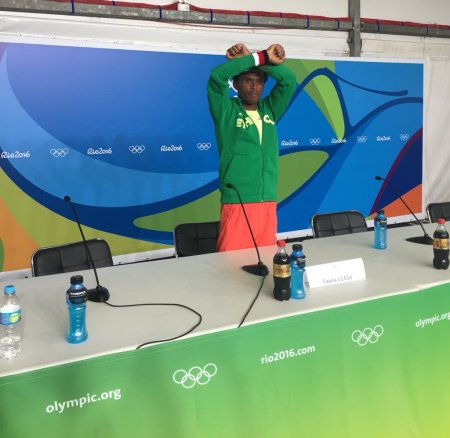 Games in Rio, and the crisis in South Sudan. But the dangers that loom large in the Horn of Africa cannot be shoved under the rug, anymore. The deafening silence of the US led international community, the African Union and the United Nations have prompted Ethiopians to wonder when the world will stop turning a blind eye to the crimes against humanity being committed by the regime in Ethiopia.
Games in Rio, and the crisis in South Sudan. But the dangers that loom large in the Horn of Africa cannot be shoved under the rug, anymore. The deafening silence of the US led international community, the African Union and the United Nations have prompted Ethiopians to wonder when the world will stop turning a blind eye to the crimes against humanity being committed by the regime in Ethiopia.
Why is the international community silent?
In her 2004 article entitled “Ten Years after Rwanda, has anything changed?”, Gayle Smith, who served as special assistant to President Clinton and senior director for African Affairs at the National Security Council during the Rwanda Genocides, explained the factors in the “interest-test” that contributed to US’ inaction during the Rwanda genocides. Smith wrote:
“…the still operative tenets of U.S. foreign policy also played a primary role in the tragedy that befell Rwanda. The conventional wisdom of U.S. foreign policy is that resources are allocated and risks are taken in direct proportion to measurable security or economic interests. Possessing no oil and posing no threat to America’s security, Rwanda simply did not meet the U.S. interests test. And with American interests now even more sharply defined by the need to secure oil and the imperative to fight terrorism, Rwanda would still not meet the bar today…”
Unfortunately, this will not happen as the situation in Ethiopia will not be labeled as “genocide” by the donor community, and will not pass the US’ “interest test”. In other words, Ethiopia would not meet the bar as Ethiopia is considered the US’ “staunch ally” in the global war on terror (GWOT), a US interest and that means the US and its allies would allow the regime to kill its own people in broad daylight…as long as their economic and security interests are protected.
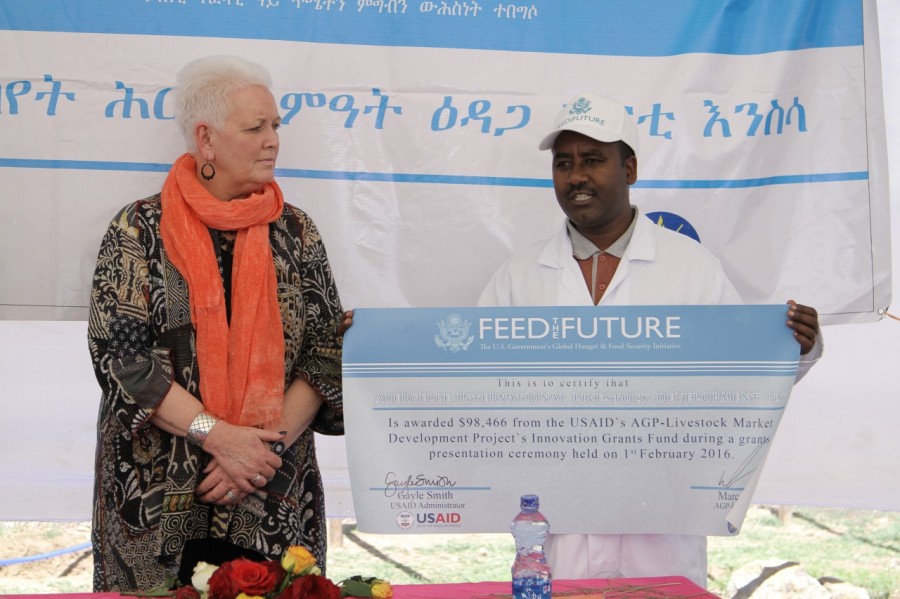 Gayle Smith who heads the United States Agency for International Development (USAID) today, and has served in Barack Obama’s National Security Agency (NSA), said geography and media coverage of events in Africa were also contributing factors to the inaction in Rwanda. She said:
Gayle Smith who heads the United States Agency for International Development (USAID) today, and has served in Barack Obama’s National Security Agency (NSA), said geography and media coverage of events in Africa were also contributing factors to the inaction in Rwanda. She said:
“…Even while Africa may have garnered more attention over the last several years, it was and remains on the back burner in foreign policy, and last on the list of U.S. national security priorities…government inattention still reinforces and is reinforced by the cursory coverage provided by a passive American media. Africa warrants only sporadic media attention, and consistent coverage only when calamities of man or nature trigger sensational images of human pain and suffering. Even then it has to compete with other crises considered more compelling because U.S. interests are at stake…”
So for those who keep asking if Ethiopian lives matter, the answer may be yes… but their lives are subordinate to European and US interests in the region…
The Rwanda genocide serves as an important case for understanding the priorities of the US led international community vis-a vis Ethiopia today. The mainstream media has been very slow to report on the Ethiopian protests, and the massacres that ensued. That may be because the response to the killings by the United States and its allies, as well as the United Nations, has been equally muted. The US led international community has been reluctant to take any punitive actions against the minority regime in the past, and now the regime has been emboldened to main and kill with impunity…
Not only did the US decide not to take any action in Rwanda, which left more than 800,000 men, women, and children to be “hacked to death by machete in the fastest slaughter of human beings ever recorded”, but went further to obstruct efforts taken by other states to stop the genocides. At the UN, the then US Ambassador Madeline Albright chose instead to cut the UN peacekeeping force by 90%-leaving 270 troops who did nothing except to powerlessly witness the slaughter. After serving as US Ambassador to the UN, she was appointed to serve as Secretary of State in the Clinton Administration.
In 1994, Susan Rice, served in the Clinton Administration and was part of Bill Clinton’s National Security Team that chose to take no action whatsoever during the Rwandan genocide. It seems Ms. Rice was more concerned about the “November elections” and the “cost of the peacekeeping mission” than the lives of the Rwandans. Regretting her inaction, Susan Rice is said to have said the following:
“…There was such a huge disconnect between the logic of each of the decisions we took along the way during the genocide and the moral consequences of the decisions taken collectively…I swore to myself that if I ever faced such a crisis again, I would come down on the side of dramatic action, going down in flames if that was required…”
Susan Rice was subsequently appointed NSC Africa director and, later, Assistant Secretary of State for African affairs. Today, not only is there no “dramatic action” from Susan E. Rice…she has been conspicuously silent. Could it be the “November elections” again? But Susan E. Rice is not the one that has remained mum on the African killing field…so have others in the Obama Administration.
Samantha Powers, US Ambassador to the United Nations published an article in 2001, in 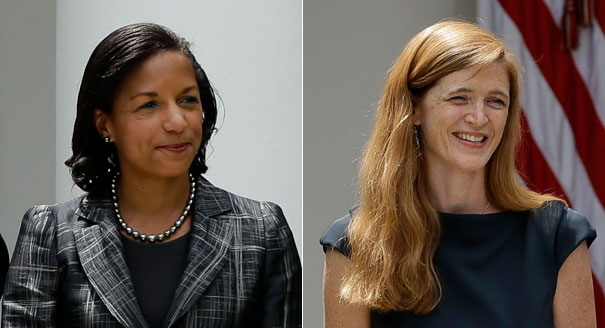 which she referred to Rice and her colleagues in the Clinton Administration as “Bystanders to Genocide”, which the title for this piece is taken from. Today, she too seems to be towing the official line. Like the State Department, she issued statements about US’ “concerns”, but has not taken any punitive actions as the regime in Ethiopia kills its own people. She, like the others in the Obama Administration have chosen to be today’s’“Bystanders to Genocide”. And just as in the Rwandan Genocides, there seems to be a coordinated effort to impede US and UN action in the case of the Ethiopian killings.
which she referred to Rice and her colleagues in the Clinton Administration as “Bystanders to Genocide”, which the title for this piece is taken from. Today, she too seems to be towing the official line. Like the State Department, she issued statements about US’ “concerns”, but has not taken any punitive actions as the regime in Ethiopia kills its own people. She, like the others in the Obama Administration have chosen to be today’s’“Bystanders to Genocide”. And just as in the Rwandan Genocides, there seems to be a coordinated effort to impede US and UN action in the case of the Ethiopian killings.
Despite the UN having several offices in Addis Ababa, Ethiopia, it had little to say about the crackdown that has led to the killing Ethiopians in the latest protests. Ditto for the African Union, European Union and the Intergovernmental Agency for Development (IGAD). None have called for an emergency Security Council meeting on the situation in Ethiopia, despite the facts that hundreds are being mercilessly massacred and the situation fast becoming a dangerous threat to international peace and security.
It should be recalled that the Ethiopian protests and killings which have been raging for months are in response to regime’s ethnic based policies, repression and marginalization and killing spree that began 25 years ago and its crimes against the Ethiopian people are well documented. Suffice it to mention a few:
- The Ethiopian regime’s security and military apparatus massacred 44 University students in cold blood in Addis Ababa in 2001. The international community blamed it on “inadequate training” and funneled millions into its coffers in the name of “capacity building and training” and he got away with it. In fact the international community tried to justify, and make excuses for, the regime’s criminal behavior.
- On May 2002, the regime’s forces massacred over 100 people in Awassa, committed illegal acts against innocent citizens who were demonstrating against a change in the administrative status of Awassa. Security agents used machine guns mounted on armored vehicles to fire into a group of unarmed peasants, workers, women and children. Twelve of those killed were children. The self-investigation conducted absolved the regime and its forces.
- The regime’s crimes of genocide and ethnic cleansing of the Anuak people in the Gambela region, southwest of the country has been widely reported by Ethiopian human rights groups as well as Genocide Watch and Survivors International. Thousands of Anuak were forced to flee from their homes into neighboring Sudan and hundreds were killed when their homes were burnt to the ground by its forces. The international community responded with deafening silence and once again, the regime got away with it.
- According to Genocide Watch, the Ethiopian government has initiated a genocidal campaign against the Ogadeni civilian population. The Ethiopian Peoples Defense Forces are using a systematic policy of intimidation, rape, assault and detention and deportation against Ogadeni civilians. Ten of thousands of people have fled…The Ethiopian Army’s counter –insurgency campaign in Ogaden has included numerous war crimes and crimes against humanity. The Ethiopian government’s policy in Ogaden is “Genocide By Attrition…”
Alen Keyes, presidential candidate in 1996, 2000, and 2008, and Assistant Secretary of State for International Organization Affairs in the Reagan Administration, explained the silence of the international community as successive Ethiopian regimes massacred their own people. He told Robert Kaplan in 1986 that:
“…If the Ethiopian government does away with tens of thousands of people nobody is interested, while if the South African government does away with thousands of people over a period of several years you can’t keep the media away…Actually got the feeling that Europeans wanted it all swept under the rug. They didn’t even want to investigate. It came through pretty clearly that their attitude was, what’s all the fuss about? This is the way the Ethiopian government has treated its people for centuries…”
The minority regime is learning from its predecessors…
So while the Ethiopian people wait for the United States and its allies, to come to their aid and save them from the brutal regime that has wreaked havoc in their lives for the last 25 years it behooves them to heed the words of Gayle Smith who said it plainly:
and save them from the brutal regime that has wreaked havoc in their lives for the last 25 years it behooves them to heed the words of Gayle Smith who said it plainly:
“…We hear a lot these days about the prominence of “American values” in driving U.S. policy. It is America’s love of freedom and liberty that led us to take on the Taliban and Afghanistan, and our commitment to democracy that led us to invade Iraq. But our dirty little secret is that the export of American values is selective. Neither America’s core belief that all men are created equal nor the fundamental principle of human dignity can compete with U.S. interests shaped not by our values, but by our economic and security imperatives. And until conscience screams as loud as interest, we cannot offer the Rwandans or any other Africans the pledge of “never again” – we can only wait for the next round of death…”
Today, another round of death stalks Ethiopia…
The regime in Ethiopia’s ethnic policies, the killings and crimes against humanity being committed with impunity, do indeed make Ethiopia, under this minority regime, the “African killing field”. Is it enough to nudge the world’s conscience and that of Samantha Powers, Susan E. Rice and Gayle Smith, and provoke them to take action and stop the massacres of Ethiopians?
Ethiopia is imploding… and history and the people of Ethiopia will judge harshly “the bystanders” to the minority Ethiopian regime’s carnage.